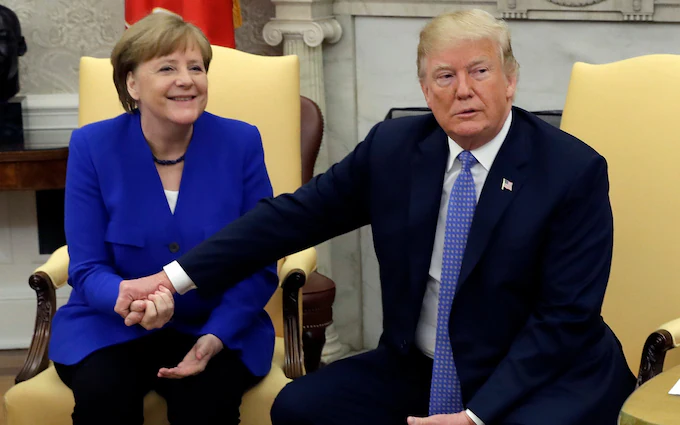Summary
- The former German chancellor’s memoirs will be published on November 26.
- Merkel will present her memoirs on December 2 alongside Barack Obama.
- Excerpts released in advance discuss Donald Trump.
Angela Merkel turned to the pope for advice on how to deal with Donald Trump when he first became U.S. president. She aimed to find ways to persuade him not to withdraw from the Paris climate accords. Merkel saw Trump as a man with a property developer’s winner-or-loser mentality, and she hoped the pope’s counsel would help her navigate the situation.
In her memoir, excerpts of which Die Zeit published on Wednesday evening, Merkel described the challenges she faced in dealing with Trump. She noted that his approach to global issues was often unpredictable, and she struggled to understand how to engage with him effectively. Merkel, known for her pragmatic and methodical leadership style, found Trump’s temperament and decision-making style difficult to manage.
Merkel also shared her observations about Trump’s fascination with Russian President Vladimir Putin and other authoritarian leaders. She felt that Trump admired their strongman tactics and took an interest in their approaches to governance. This, according to Merkel, further complicated her efforts to find common ground with Trump on critical issues like climate change and international cooperation.
The memoir highlights the stark contrast between Merkel’s leadership approach and Trump’s. While Merkel emphasized diplomacy, multilateralism, and stability, she found Trump’s focus on unilateral action and his admiration for authoritarian regimes troubling. Despite these differences, Merkel persisted in trying to find diplomatic solutions, hoping that advice from influential figures like the pope might help her bridge the gap.
“He viewed everything through the lens of the property developer he had been before entering politics,” she wrote. “Each piece of land could only be sold once, and if he didn’t get it, someone else would. That was his worldview.”
When Merkel asked Pope Francis for advice on dealing with people “with fundamentally different views,” he immediately understood she was referring to Trump and his desire to withdraw from the climate accords, she wrote.
“Bend, bend, bend, but make sure it doesn’t break,” he advised Merkel, according to her account.
When Trump took office in 2017, Merkel was one of the longest-serving elected leaders in the world and by far the most influential figure in the European Union. She had played a key role in shaping Germany and Europe’s response to major challenges, including the euro zone debt crisis, the COVID-19 pandemic, and Russia’s initial 2014 invasion of Ukraine.
As much of the world worried about Trump’s presidency, Merkel remained unruffled. She often invoked values like freedom and human rights, leading some to call her the true “leader of the free world,” a title traditionally reserved for U.S. presidents.
Written before Trump’s reelection, the book expresses her “heartfelt hope” that Vice President Kamala Harris would defeat her rival.
Merkel will publish her memoir, titled “Freedom: Memories 1954-2021,” in over 30 countries on Nov. 26. She will launch the book in the U.S. a week later at a Washington event with former President Barack Obama, with whom she developed a close political relationship.
Germany’s first female leader remained popular with voters at the end of her 16-year tenure, but her legacy has faced increased scrutiny. Some have blamed the significant investments in Russian energy made by her governments for both Russia’s full-scale invasion of Ukraine in February 2022 and Germany’s current economic struggles.
Merkel has expressed no regret about her Russia policies and has kept a low profile since leaving office.
In the published extracts of her memoir, she reflects on her many encounters with Putin, describing him as a man desperate to be taken seriously. “I experienced him as someone who didn’t want to be disrespected, ready to lash out at all times,” she wrote. “You might find that childish and contemptible, you might shake your head at that. But it meant Russia never vanished from the map.”
At one point, she suggests that Putin timed his 2022 invasion of Ukraine to coincide with her departure from office. “You won’t always be Chancellor, and then they’ll join NATO,” he said of Ukraine. “And I want to prevent that.” She also pointed out that some Central and Eastern European leaders had been guilty of wishful thinking. “They seem to want the country to just disappear, to not exist. I couldn’t blame them… But Russia, heavily nuclear-armed, did exist.”

